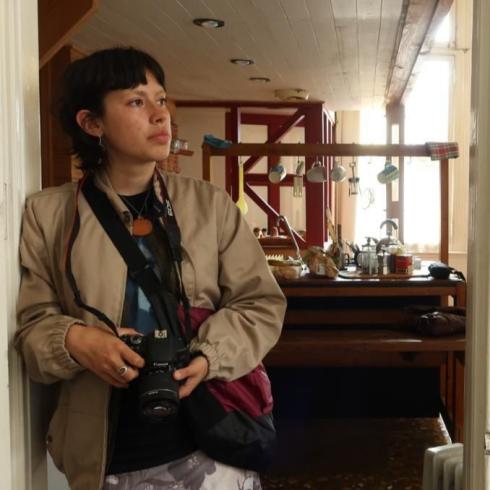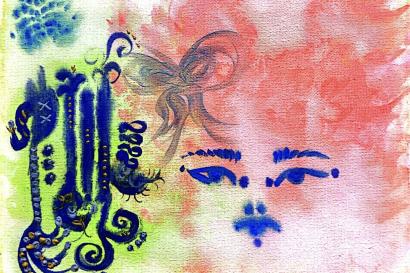My visit to MOCAK, the Museum of Contemporary Art in Krakow, was an unexpected highlight of my time in the city. Arriving early, just as the museum opened, I took a moment to sit in the café, sipping coffee while finishing some work. The calm, creative energy of the space set the tone for what would become a deeply reflective experience. For only 14 zloty—about 5 euros—I had access to both the permanent and temporary exhibitions. What awaited me inside wasn’t just a collection of art but a profound exploration of identity, expression, and transformation.
As a queer individual and feminist, I’ve always been drawn to art that challenges norms and questions societal structures. Stepping into MOCAK felt like entering a space where these ideas were not just represented but amplified and celebrated.
Valie Export: Metanoia
The first exhibition I explored was Metanoia, a curated selection of 29 video works by Valie Export spanning from 1966 to 2010. The term “metanoia,” which refers to spiritual and mental transformation, felt like an apt descriptor for Export’s provocative oeuvre. Known for her groundbreaking feminist and performance art, Export challenges the boundaries of gender, the body, and societal expectations.
Watching her videos, I was struck by the raw vulnerability and power in her work. Pieces like Touch Cinema and Action Pants: Genital Panic confront viewers with the objectification of women, flipping the gaze to make us question our complicity in patriarchal systems. For me, as someone who navigates the intersections of feminism and queer identity, these works resonated deeply. Export’s art isn’t just an intellectual exercise—it’s a visceral confrontation with the ways our bodies are policed and politicized. Her ability to combine intimacy with defiance reminded me of the importance of reclaiming agency over one’s narrative, a theme that feels personal in my own life.
Krystian Lupa: Live Factory 2: Warhol by Lupa
Descending further into the museum’s lower level, I encountered Krystian Lupa’s Live Factory 2: Warhol by Lupa. This immersive installation reimagines Andy Warhol’s Factory, a space synonymous with avant-garde creativity and queer subversion. Entering the exhibit felt like stepping into a time machine bound for 1960s New York.
What stood out to me was how Lupa captured not just the physicality of Warhol’s Factory but its spirit—an open, chaotic, and deeply collaborative environment where boundaries between art and life blurred. As someone who values spaces where queer expression thrives, this installation felt affirming. Warhol’s Factory wasn’t just a studio; it was a sanctuary for outsiders, a place where identities could be explored and celebrated without judgment. Walking through the installation, I couldn’t help but think about the importance of creating those kinds of spaces today, both in art and in life.
Małgorzata Blamowska: All Incarnations of Woman
The Beta Gallery housed Małgorzata Blamowska’s All Incarnations of Woman, an exhibition that captivated me with its bold depictions of human emotion and identity. Blamowska’s portraits are intense, almost caricatured, but in the best way possible. Each brushstroke seemed to reveal layers of her subjects’ mental and emotional states, making the paintings feel alive.
As a feminist, I found Blamowska’s work particularly powerful. Her ability to convey the complexities of womanhood—the beauty, the pain, the resilience—was striking. These weren’t sanitized or idealized depictions; they were raw, unflinching, and unapologetic. One painting in particular, depicting a woman mid-laugh with tears in her eyes, felt like a mirror of my own experiences—joy and struggle intertwined.
Blamowska’s art reminded me of the importance of visibility and representation. To see women depicted with such intensity and authenticity felt revolutionary, a reclaiming of the narrative often shaped by the male gaze.
As I wandered through MOCAK, I realized how deeply personal this experience was for me. Each exhibition felt like a dialogue—not just between the artist and the viewer, but between my past and present selves. Growing up, I didn’t always have access to spaces where queer and feminist identities were affirmed. Walking through these exhibits, I felt a sense of belonging, a reminder that art has the power to validate and transform. MOCAK’s commitment to showcasing diverse voices, from Export’s feminist provocations to Lupa’s queer homage and Blamowska’s explorations of womanhood, felt like an embrace of everything I hold dear. It’s not just a museum; it’s a space where identities can be explored, challenged, and celebrated.

Layla Santiago
An avid hiker and rookie musician, I love being outdoors and jamming on the guitar whether solo or with friends. Having Mixtec, Mexican, and Polish heritage has allowed me to appreciate diverse cultures and perspectives.





